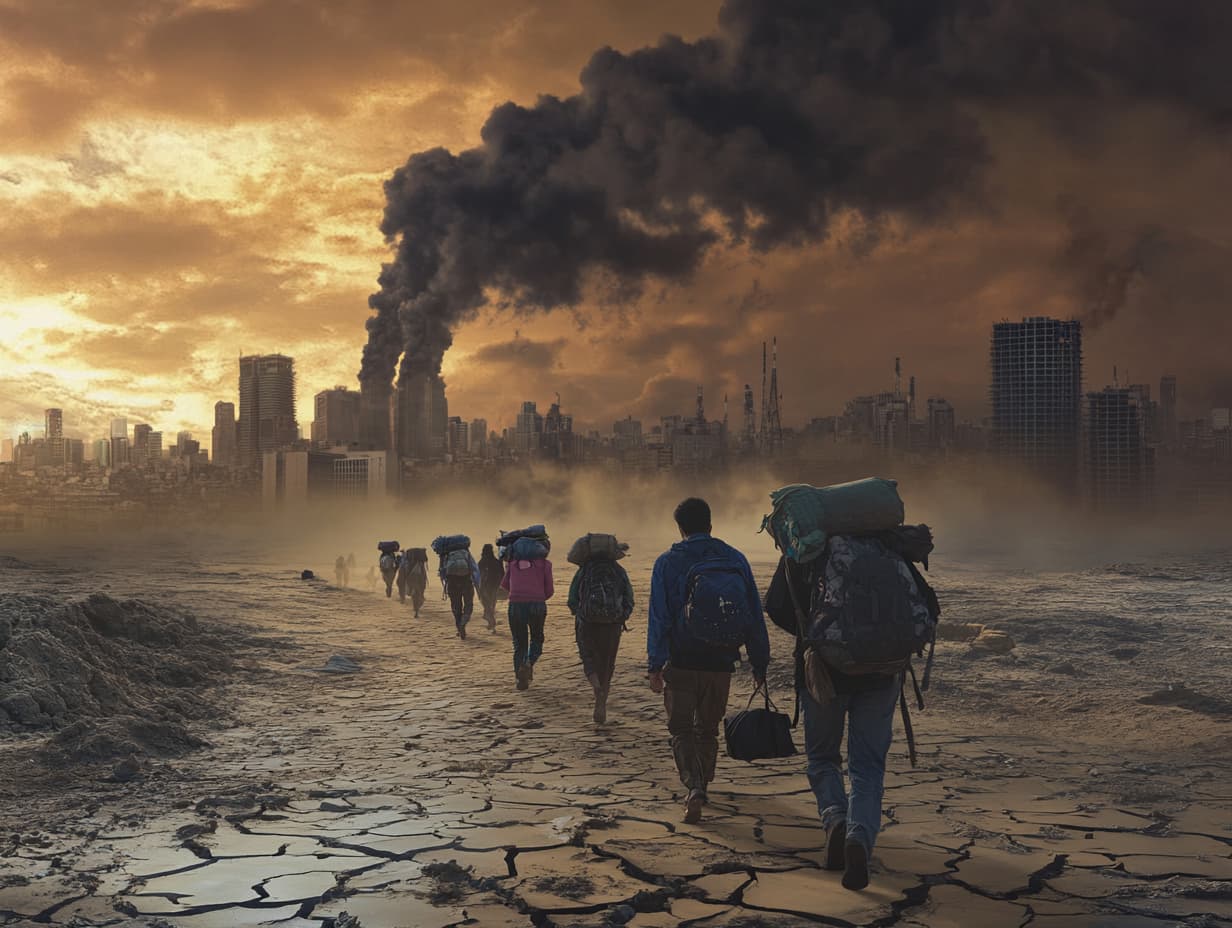Introduction Climate change significantly impacts the realization of socio-economic rights globally. Environmental changes directly threaten fundamental rights such as health, food, water, and shelter. International standards define these rights clearly, yet climate change poses serious implementation challenges.
Right to Adequate Food The right to adequate food faces significant threats from climate change. Droughts reduce crop yields drastically. Changing rainfall patterns disrupt agricultural cycles. These disruptions result in food scarcity for millions worldwide. Climate-induced pests and diseases further reduce agricultural productivity, intensifying food insecurity significantly.
Right to Safe Drinking Water Water scarcity linked to climate change undermines the right to safe drinking water. Rising temperatures accelerate water evaporation. Reduced rainfall limits freshwater availability. This shortage affects access to clean and safe water resources. Pollution and contamination risks increase as freshwater resources diminish, further restricting safe water availability.
Housing and Infrastructure Extreme weather events compromise housing rights severely. Floods destroy homes and infrastructure rapidly. Hurricanes and cyclones displace thousands annually. Adequate housing becomes increasingly inaccessible due to such climatic events. Infrastructure damage from storms and floods significantly strains economic resources, limiting reconstruction efforts.
Impact on Health Rights Health rights deteriorate as climate change advances. Rising temperatures increase heat-related illnesses. Vector-borne diseases spread rapidly in warmer climates. Public health systems struggle to manage these growing threats. Increased respiratory diseases due to pollution from wildfires further exacerbate public health challenges.
Economic Rights and Employment Economic rights, including employment opportunities, suffer from climate impacts. Agricultural workers lose jobs due to failing crops. Fisheries collapse as ocean temperatures rise. Economic stability deteriorates significantly in climate-vulnerable regions. Industries dependent on stable climates, such as tourism, experience declining revenues, threatening livelihoods.
International Law and Human Rights International law recognizes socio-economic rights explicitly. The Universal Declaration of Human Rights includes food, health, and housing rights. The International Covenant on Economic, Social, and Cultural Rights further reinforces these rights. Climate change, however, weakens countries’ ability to fulfill these obligations effectively.
Challenges in Developing Countries Developing nations face greater challenges in protecting socio-economic rights. Limited financial resources restrict their ability to respond to climate threats. International financial support remains insufficient to bridge these gaps. Inadequate funding exacerbates poverty, creating cycles of vulnerability and limited adaptive capacity.
Displacement and Socio-Economic Consequences Displacement caused by climate change presents severe socio-economic consequences. Climate migrants lose access to stable livelihoods. Displacement disrupts education for children. Host countries often struggle to provide adequate support to displaced communities. Migration also strains urban infrastructure and social services, causing tension within host communities.
Vulnerabilities of Women and Children Women and children experience intensified socio-economic vulnerabilities due to climate change. Women often bear responsibility for securing food and water. Scarcity increases their workloads significantly. Children face increased malnutrition and disrupted education. Women and children frequently have limited decision-making power, exacerbating their vulnerability to climate impacts.
Indigenous Communities Indigenous communities suffer disproportionately from climate impacts. Their livelihoods closely depend on natural resources. Climate change destroys ecosystems vital for their survival. Socio-economic rights of indigenous populations face significant erosion. Indigenous knowledge, crucial for adaptation strategies, remains underutilized in policy-making.
Urban Vulnerabilities Urban areas also face substantial threats from climate-induced disasters. Cities experiencing rapid growth lack adequate infrastructure. Urban poor populations live in vulnerable conditions. Flooding and heatwaves impact their socio-economic stability dramatically. Poor urban planning amplifies these risks, requiring comprehensive climate-resilient urban development strategies.
Adaptation Measures Adaptation measures remain essential for protecting socio-economic rights. Investments in resilient infrastructure reduce disaster impacts. Sustainable agricultural practices increase food security. International cooperation supports effective adaptation strategies. Enhancing adaptive capacities at community and national levels ensures resilience against climate threats.
Mitigation Efforts Mitigation efforts also play a crucial role in protecting socio-economic rights. Reducing greenhouse gas emissions stabilizes climate conditions. Transitioning to renewable energy sources creates new economic opportunities. These actions ensure long-term socio-economic security. Policies promoting renewable energy adoption drive economic growth and employment opportunities.
Need for Strengthened International Commitments However, current global efforts remain insufficient. Countries fail to meet international climate commitments consistently. Weak implementation of climate agreements threatens future socio-economic stability. Stronger enforcement mechanisms and international accountability measures are necessary to ensure effective climate action.
Role of Human Rights Organizations International human rights organizations emphasize climate accountability. Organizations such as the United Nations advocate integrating human rights into climate policies. Legal frameworks linking climate actions and socio-economic rights strengthen protection measures. Advocacy efforts highlight the urgency of addressing climate-related human rights impacts.
Technological Innovations Technology offers innovative solutions to climate-related socio-economic challenges. Advanced forecasting systems improve disaster preparedness. Water-saving technologies alleviate resource scarcity. Technological innovation enhances resilience significantly. Digital platforms can facilitate rapid information dissemination and support disaster response effectively.
Public Awareness and Corporate Responsibility Public awareness plays an essential role in addressing socio-economic rights affected by climate change. Education campaigns highlight climate threats clearly. Increased public understanding supports stronger climate action. Citizens demand accountability from governments effectively. Corporate responsibility influences socio-economic outcomes related to climate change. Businesses adopting sustainable practices reduce environmental impact, supporting community stability.
Conclusion
Addressing climate impacts on socio-economic rights demands urgent action. International collaboration, effective policy implementation, and local engagement remain critical. Strengthening socio-economic resilience against climate threats requires immediate global attention, sustained effort, and comprehensive strategies integrating human rights considerations.
